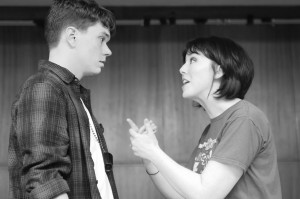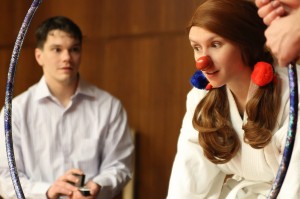
UPPER MIDDLE CLASS WHITE, written and directed by Emily Orton Bonner, is the inaugural production of Thespionage Theater Company, which trumpets itself as a ‘pay what you can’ theater company; every ticket is priced by the audience member, and every dollar made is put into the budget for the next show. It’s an interesting new approach to small-theater funding in an age where the little guys are increasingly struggling against larger marketing machines, dwindling grant money, and thinly spread audiences of theatergoers.
As one might expect, UPPER MIDDLE CLASS WHITE has a strong feeling of Do It Yourself about it; the stage is bare with the exception of a few stage blocks, representative doors with curtains, and racks of props visible to the audience throughout the show. Steven (ably played by Frank Emilio), an uptight young man in desperate need of a coming-of-age, becomes the owner of a house in a sketchy part of town, and moves in with a cadre of wacky, vaguely-post-college age squatters who have been living there.

The characters are more caricatures than fully developed characters, although they are, to a person, well-manned by the cast. (I particularly enjoyed Amanda Lynch’s portrayal of Seven, Steven’s off-tempo love interest, perhaps reminiscent of a Scott Pilgrim or Venture Brothers dream girl.). Watching Steven be repeatedly embarassed, first by a gun-toting, muffin-baking white rapper (Wesley Fenza), then a weed-dealing LARP fanatic (Rob Tomlinson), then a forward, sexually-charged stripper (Jean Tomlin), is a great deal of fun.
However, UPPER MIDDLE CLASS WHITE loses some steam in the second act, when the light-hearted banter and cartoonish embarassments are replaced by a series of romantic comedy hallmarks: arguing couples, a drawn-out breakup, the dull patter of espoused self-doubt, and an ending that’s easy to see coming.
Overall, this show could use a sizeable trim and a stronger thematic focus, but features very enjoyable moments which are well-navigated by a cast that’s cohesive and clearly having a lot of fun. Most certainly worth what you can afford, if not a couple dollars more. [First Unitarian Church of Philadelphia, 2125 Chestnut Street] May 2–4, 2014, thespionage.com.

Actually, I disagree that the second act is less than the first, because it is when the audience begins to become intimately attached with the characters. The ending is not the usual, as the two lovers are not reunited “happily ever after.” The energy keeps up throughout the play – kudos to the machine behind the imaginary cars! Raunchy, but in the spirit of fun. I think it will go far.